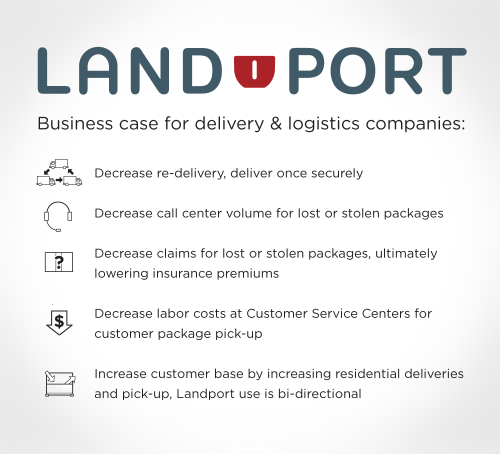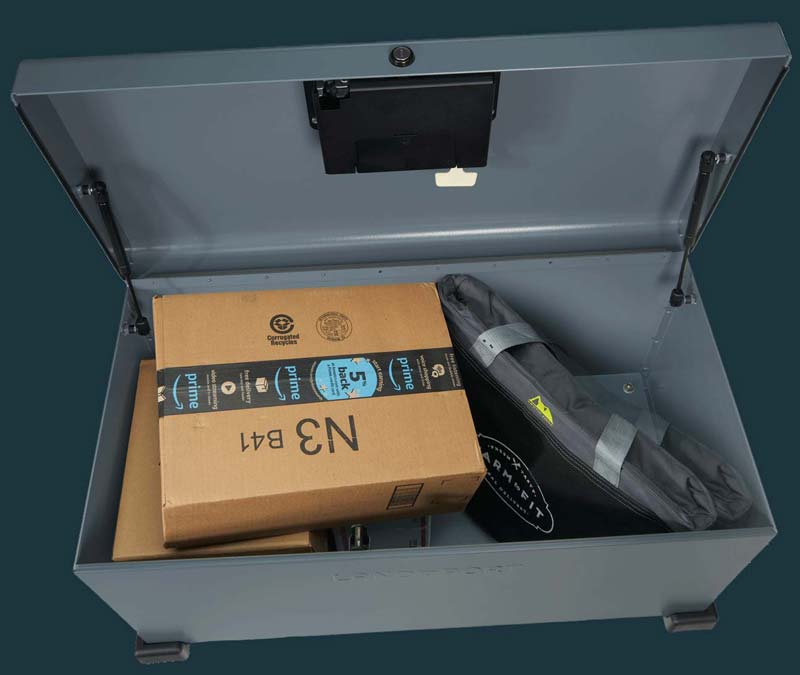Delivery Companies
You’re in the delivery business. We’re in receiving business.
Want to make sure your customers are happy? The first step is to help make sure they receive what you send. Landport is a lockbox that delivery drivers use to drop off packages securely and safely. The driver simply enters a code, places your package inside, and closes the lid to lock it. The homeowner or customer can open it anytime and retrieve packages. Let your customers know about Landport .
No more stolen packages.
Reduces delivery problems, customer calls, and claims.
Helps ensure satisfied customers and repeat orders for you.
Works with all major delivery companies.

Landport makes life easier for the major carriers.
It’s well known that the increase in eCommerce has placed demands on the major carriers. Back in the day, package home delivery was saved for special occasions like Mother’s Day, anniversaries, and birthdays (think FTD Florists), then one big push for Christmas and Holidays.
Now, with the surge in online ordering, and new companies appearing on the scene whose business model depends upon delivering to their customer’s door, it seems like everyday is Christmas. UPS, FedEx, and USPS trucks are a common site on streets all over town and in the suburbs. Parcels now arrive on Saturdays and Sundays – days once reserved for time-sensitive, mission- critical business parcels. In short, daily, multiple deliveries to homes and small businesses are no longer the exception, and are quickly becoming the norm.
Landport helps carriers complete deliveries in a safe and secure way.
The good news is this increase in shipped items means more business for carriers and encourages innovation. However, this surge in shipping is not without its challenges, since the foundation of a carriers’ business is contingent on successfully completing deliveries in a safe and efficient way.
UPS, FedEx, DHL, and the USPS all stand to gain from embracing Landport. Quite simply, Landport makes consistently completing package deliveries easier.
A key way in which Landport will help carrier companies run a smoother operation is by minimizing missed deliveries. As told to the Wall Street Journal, according to UPS Chief Executive Officer David Abney, anytime UPS can avoid missed deliveries, “that is real meaningful dollars for us.” By making missed deliveries a thing of the past, Landport is poised to become a new and much needed point on the logistical chain. If you do the math, the carrier companies stand to save countless minutes in labor (not to mention dollars) by securing the point at which a package is delivered.
Fewer missed deliveries means better business and happier customers.
There’s also the benefit of fewer claims filed for missing packages, which translates into decreased workload at customer service centers, shorter lines to pick up packages, and happier customers.
Here are several important ways in which Landport facilitates efficient package delivery:
Landport:
- eliminates the need for the driver to make multiple attempts to deliver a package
- eliminates the need for customers to place a package in a “secret” place, which can lead to inconsistent directions and mis-information. With Landport, the parcel is always placed in the same safe location.
- allows customers to leave written authorization for packages as required in a safe place – no missing important pieces of paper that can delay pick-ups or returns.
- creates a more efficient drop-off for the driver – delivery personnel can just pop in the parcel and be on their way.
- reduces claims for lost packages, which ultimately keeps operating costs down.
In a very simple and direct way, Landport removes the uncertainty around leaving a package at a front door. It establishes a secure, final point of delivery that both the carrier and the driver trust. Apprehension around a package making it to its final destination is eliminated on both sides of the equation, making for a better business transaction, and allowing delivery companies to deliver not only packages, but on their customer service commitments.


